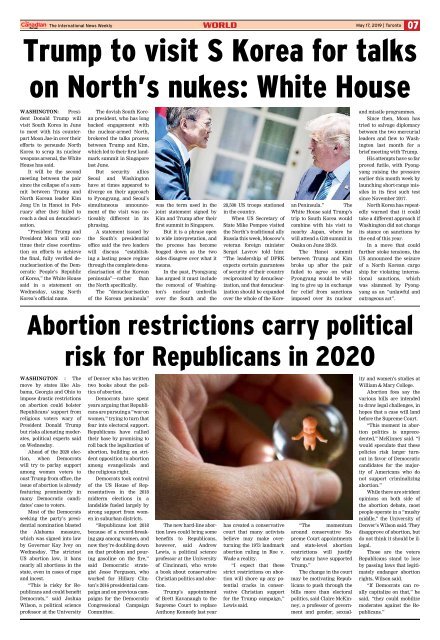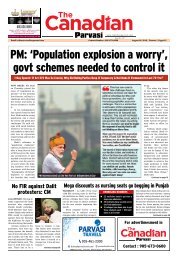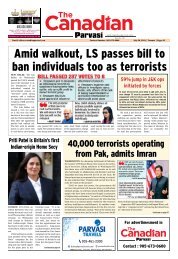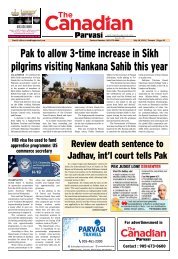You also want an ePaper? Increase the reach of your titles
YUMPU automatically turns print PDFs into web optimized ePapers that Google loves.
<strong>The</strong> International News Weekly world<br />
May 17, 2019 | Toronto<br />
07<br />
Trump to visit S Korea for talks<br />
on North’s nukes: White House<br />
Washington: President<br />
Donald Trump will<br />
visit South Korea in June<br />
to meet with his counterpart<br />
Moon Jae-in over their<br />
efforts to persuade North<br />
Korea to scrap its nuclear<br />
weapons arsenal, the White<br />
House has said.<br />
It will be the second<br />
meeting between the pair<br />
since the collapse of a summit<br />
between Trump and<br />
North Korean leader Kim<br />
Jong Un in Hanoi in February<br />
after they failed to<br />
reach a deal on denuclearisation.<br />
“President Trump and<br />
President Moon will continue<br />
their close coordination<br />
on efforts to achieve<br />
the final, fully verified denuclearisation<br />
of the Democratic<br />
People’s Republic<br />
of Korea,” the White House<br />
said in a statement on<br />
Wednesday, using North<br />
Korea’s official name.<br />
<strong>The</strong> dovish South Korean<br />
president, who has long<br />
backed engagement with<br />
the nuclear-armed North,<br />
brokered the talks process<br />
between Trump and Kim,<br />
which led to their first landmark<br />
summit in Singapore<br />
last June.<br />
But security allies<br />
Seoul and Washington<br />
have at times appeared to<br />
diverge on their approach<br />
to Pyongyang, and Seoul’s<br />
simultaneous announcement<br />
of the visit was noticeably<br />
different in its<br />
phrasing.<br />
A statement issued by<br />
the South’s presidential<br />
office said the two leaders<br />
will discuss “establishing<br />
a lasting peace regime<br />
through the complete denuclearisation<br />
of the Korean<br />
peninsula”—rather than<br />
the North specifically.<br />
<strong>The</strong> “denuclearisation<br />
of the Korean peninsula”<br />
was the term used in the<br />
joint statement signed by<br />
Kim and Trump after their<br />
first summit in Singapore.<br />
But it is a phrase open<br />
to wide interpretation, and<br />
the process has become<br />
bogged down as the two<br />
sides disagree over what it<br />
means.<br />
In the past, Pyongyang<br />
has argued it must include<br />
the removal of Washington’s<br />
nuclear umbrella<br />
over the South and the<br />
28,500 US troops stationed<br />
in the country.<br />
When US Secretary of<br />
State Mike Pompeo visited<br />
the North’s traditional ally<br />
Russia this week, Moscow’s<br />
veteran foreign minister<br />
Sergei Lavrov told him:<br />
“<strong>The</strong> leadership of DPRK<br />
expects certain guarantees<br />
of security of their country<br />
reciprocated by denuclearization,<br />
and that denuclearization<br />
should be expanded<br />
over the whole of the Korean<br />
Peninsula.” <strong>The</strong><br />
White House said Trump’s<br />
trip to South Korea would<br />
combine with his visit to<br />
nearby Japan, where he<br />
will attend a G20 summit in<br />
Osaka on June 28-29.<br />
<strong>The</strong> Hanoi summit<br />
between Trump and Kim<br />
broke up after the pair<br />
failed to agree on what<br />
Pyongyang would be willing<br />
to give up in exchange<br />
for relief from sanctions<br />
imposed over its nuclear<br />
and missile programmes.<br />
Since then, Moon has<br />
tried to salvage diplomacy<br />
between the two mercurial<br />
leaders and flew to Washington<br />
last month for a<br />
brief meeting with Trump.<br />
His attempts have so far<br />
proved futile, with Pyongyang<br />
raising the pressure<br />
earlier this month week by<br />
launching short-range missiles<br />
in its first such test<br />
since November 2017.<br />
North Korea has repeatedly<br />
warned that it could<br />
take a different approach if<br />
Washington did not change<br />
its stance on sanctions by<br />
the end of this year.<br />
In a move that could<br />
further stoke tensions, the<br />
US announced the seizure<br />
of a North Korean cargo<br />
ship for violating international<br />
sanctions, which<br />
was slammed by Pyongyang<br />
as an “unlawful and<br />
outrageous act”.<br />
Abortion restrictions carry political<br />
risk for Republicans in 2020<br />
Washington : <strong>The</strong><br />
move by states like Alabama,<br />
Georgia and Ohio to<br />
impose drastic restrictions<br />
on abortion could bolster<br />
Republicans’ support from<br />
religious voters wary of<br />
President Donald Trump<br />
but risks alienating moderates,<br />
political experts said<br />
on Wednesday.<br />
Ahead of the 2020 election,<br />
when Democrats<br />
will try to parlay support<br />
among women voters to<br />
oust Trump from office, the<br />
issue of abortion is already<br />
featuring prominently in<br />
many Democratic candidates’<br />
case to voters.<br />
Most of the Democrats<br />
seeking the party’s presidential<br />
nomination blasted<br />
the Alabama measure,<br />
which was signed into law<br />
by Governor Kay Ivey on<br />
Wednesday. <strong>The</strong> strictest<br />
US abortion law, it bans<br />
nearly all abortions in the<br />
state, even in cases of rape<br />
and incest.<br />
“This is risky for Republicans<br />
and could benefit<br />
Democrats,” said Joshua<br />
Wilson, a political science<br />
professor at the University<br />
of Denver who has written<br />
two books about the politics<br />
of abortion.<br />
Democrats have spent<br />
years arguing that Republicans<br />
are pursuing a “war on<br />
women,” trying to turn that<br />
fear into electoral support.<br />
Republicans have rallied<br />
their base by promising to<br />
roll back the legalization of<br />
abortion, building on strident<br />
opposition to abortion<br />
among evangelicals and<br />
the religious right.<br />
Democrats took control<br />
of the US House of Representatives<br />
in the 2018<br />
midterm elections in a<br />
landslide fueled largely by<br />
strong support from women<br />
in suburban districts.<br />
“Republicans lost 2018<br />
because of a record-breaking<br />
gap among women, and<br />
now they’re doubling down<br />
on that problem and pouring<br />
gasoline on the fire,”<br />
said Democratic strategist<br />
Jesse Ferguson, who<br />
worked for Hillary Clinton’s<br />
2016 presidential campaign<br />
and on previous campaigns<br />
for the Democratic<br />
Congressional Campaign<br />
Committee.<br />
<strong>The</strong> new hard-line abortion<br />
laws could bring some<br />
benefits to Republicans,<br />
however, said Andrew<br />
Lewis, a political science<br />
professor at the University<br />
of Cincinnati, who wrote<br />
a book about conservative<br />
Christian politics and abortion.<br />
Trump’s appointment<br />
of Brett Kavanaugh to the<br />
Supreme Court to replace<br />
Anthony Kennedy last year<br />
has created a conservative<br />
court that many activists<br />
believe may make overturning<br />
the 1973 landmark<br />
abortion ruling in Roe v.<br />
Wade a reality.<br />
“I expect that these<br />
strict restrictions on abortion<br />
will shore up any potential<br />
cracks in conservative<br />
Christian support<br />
for the Trump campaign,”<br />
Lewis said.<br />
“<strong>The</strong> momentum<br />
around conservative Supreme<br />
Court appointments<br />
and state-level abortion<br />
restrictions will justify<br />
why many have supported<br />
Trump.”<br />
<strong>The</strong> change in the court<br />
may be motivating Republicans<br />
to push through the<br />
bills more than electoral<br />
politics, said Claire McKinney,<br />
a professor of government<br />
and gender, sexuality<br />
and women’s studies at<br />
William & Mary College.<br />
Abortion foes say the<br />
various bills are intended<br />
to draw legal challenges, in<br />
hopes that a case will land<br />
before the Supreme Court.<br />
“This moment in abortion<br />
politics is unprecedented,”<br />
McKinney said. “I<br />
would speculate that these<br />
policies risk larger turnout<br />
in favor of Democratic<br />
candidates for the majority<br />
of Americans who do<br />
not support criminalizing<br />
abortion.”<br />
While there are strident<br />
opinions on both side of<br />
the abortion debate, most<br />
people operate in a “mushy<br />
middle,” the University of<br />
Denver’s Wilson said. <strong>The</strong>y<br />
disapprove of abortion, but<br />
do not think it should be illegal.<br />
Those are the voters<br />
Republicans stand to lose<br />
by passing laws that legitimately<br />
endanger abortion<br />
rights, Wilson said.<br />
“If Democrats can really<br />
capitalize on that,” he<br />
said, “they could mobilize<br />
moderates against the Republicans.”
















